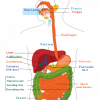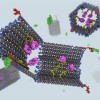Mapping the migratory patterns of……brain cancer cells?
We’ve all watched fascinating David Attenborough documentaries about the migratory patterns of birds, sub-Saharan animals and butterflies, but cancer cells? Yes, cancer cells migrate too. More specifically, brain cancer cells.
Researchers have known for a while that not only are glioblastoma multiforme cells highly resistant to chemotherapy, but they can also deftly migrate away from sites of radiation or surgery, setting up camp and regrowing in other parts of the brain. This means that brain cancer is notoriously difficult to treat and the prognosis is almost always grim.
Last year the New York Times described Hanahan and Weinberg’s Hallmarks of Cancer as follows:
“Through a series of random mutations, genes that encourage cellular division are pushed into overdrive, while genes that normally send growth-restraining signals are taken offline. With the accelerator floored and the brake lines cut, the cell and its progeny are free to rapidly multiply. More mutations accumulate, allowing the cancer cells to elude other safeguards and to invade neighboring tissue and metastasize.”
This is a nice analogy, relating overgrowth of cells paired with lack of cell death (apoptosis) as the accelerator and brakes of a car.
However Amy Keating and colleagues at the University of Colorado Cancer Center focused on the car’s GPS system. They published data in Nature: Oncogene showing that when a receptor tyrosine kinase involved in cancer cell growth, Mer, is switched off, significantly less cancer cells migrate to neighboring tissue in cultured laboratory cells. Keating found that not only does Mer interfere with the molecular signaling pathway, but also the cytoskeletal organization (the structure of the cell).
In other words, the Mer switch interferes with the electrics of the GPS system as well as the steering wheel of the car.
This added to their previous finding that Mer could increase some brain cancer cells’ sensitivity to chemotherapy.
So Mer inhibition could be a “double whammy” approach to treating brain cancer: kill as many cancer cells as possible and stop those remaining from migrating.
| Print article | This entry was posted by Amy Nisselle on January 18, 2012 at 12:24 pm, and is filed under Inside Cancer. Follow any responses to this post through RSS 2.0. You can leave a response or trackback from your own site. |









